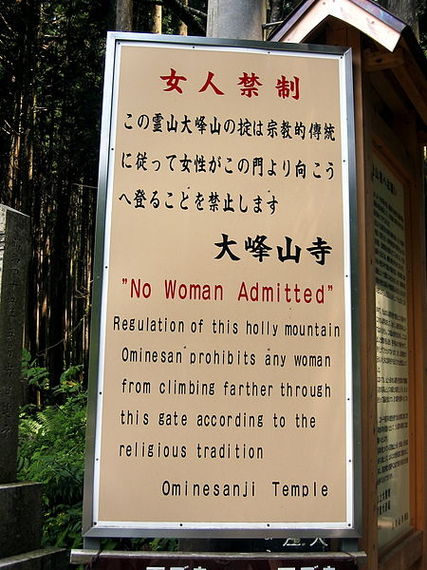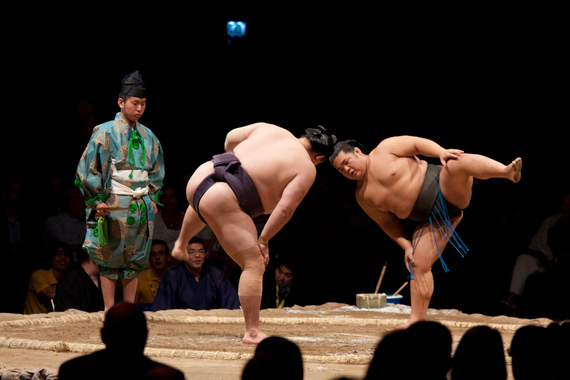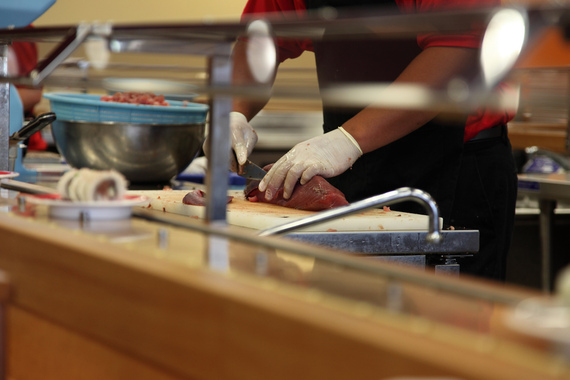While much headway has been made in Japan regarding women's rights, the country still has a few prevailing bans that are proving more stubborn to eliminate.
1. Climbing to the top of Mount Omine
Reason: Women are a "distraction"
Mount Omine in Nara Prefecture (officially known as Mt. Sanjo) is a UNESCO World Heritage Site. You might be surprised to learn that UNESCO doesn't take gender into consideration when awarding World Heritage status, but heritage sites that ban the entire female race can be found in Burma, India, and Greece as well as Japan.
The mountain won World Heritage status as part of a larger category of Sacred Sites and Pilgrimage Routes in the Kii Mountain Range. The popular Kumano Pilgrimage route goes through the sacred area but makes allowances for women hiking through this part. They are still prohibited, however, from climbing up to Ominesanji Temple at the top of the mountain.
2. Entering the sumo ring, taking part in sumo competitions and rituals
Reason: women violate the purity of the sumo ring
The Sumo Association claims that since women have traditionally not been allowed to take part in sumo activities through the centuries, that it would be a dishonor to all of their ancestors to change it. In addition, despite the existence of women's sumo, called onnazumo, since the early 18th century, the female version of the sport is forbidden from having professional status.
3. Semi-Ban: Staying in most "capsule hotels"
Reason: Capsule hotels are targeted towards businessmen
There are, nowadays, some capsule hotels that allow women. But if a woman just randomly rocks up to a capsule hotel, she's going to be turned away 99 times out of 100.
4. Semi-Ban: Becoming sushi chefs
Reason: Women's hands are too warm, so could ruin the flavor of the sushi.
This subject has been discussed in much detail in several English media outlets, and it was declared an urban myth by National Public Radio in the U.S.. But the fact remains that women are rarely seen preparing sushi at restaurants in Japan as it is still considered to be the domain of male chefs.
Will these restrictions be lifted anytime soon? Only the Japanese people can decide.
This is a summary of the original article in RocketNews24. For the full article click here.
Support HuffPost
Our 2024 Coverage Needs You
Your Loyalty Means The World To Us
At HuffPost, we believe that everyone needs high-quality journalism, but we understand that not everyone can afford to pay for expensive news subscriptions. That is why we are committed to providing deeply reported, carefully fact-checked news that is freely accessible to everyone.
Whether you come to HuffPost for updates on the 2024 presidential race, hard-hitting investigations into critical issues facing our country today, or trending stories that make you laugh, we appreciate you. The truth is, news costs money to produce, and we are proud that we have never put our stories behind an expensive paywall.
Would you join us to help keep our stories free for all? Your contribution of as little as $2 will go a long way.
Can't afford to donate? Support HuffPost by creating a free account and log in while you read.
As Americans head to the polls in 2024, the very future of our country is at stake. At HuffPost, we believe that a free press is critical to creating well-informed voters. That's why our journalism is free for everyone, even though other newsrooms retreat behind expensive paywalls.
Our journalists will continue to cover the twists and turns during this historic presidential election. With your help, we'll bring you hard-hitting investigations, well-researched analysis and timely takes you can't find elsewhere. Reporting in this current political climate is a responsibility we do not take lightly, and we thank you for your support.
Contribute as little as $2 to keep our news free for all.
Can't afford to donate? Support HuffPost by creating a free account and log in while you read.
Dear HuffPost Reader
Thank you for your past contribution to HuffPost. We are sincerely grateful for readers like you who help us ensure that we can keep our journalism free for everyone.
The stakes are high this year, and our 2024 coverage could use continued support. Would you consider becoming a regular HuffPost contributor?
Dear HuffPost Reader
Thank you for your past contribution to HuffPost. We are sincerely grateful for readers like you who help us ensure that we can keep our journalism free for everyone.
The stakes are high this year, and our 2024 coverage could use continued support. If circumstances have changed since you last contributed, we hope you’ll consider contributing to HuffPost once more.
Already contributed? Log in to hide these messages.




